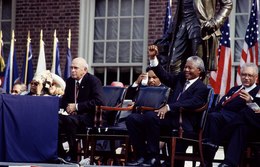 Global Information
Global InformationNegotiations to end apartheid in South Africa information

| Part of a series on |
| Apartheid |
|---|
|
The apartheid system in South Africa was ended through a series of bilateral and multi-party negotiations between 1990 and 1993. The negotiations culminated in the passage of a new interim Constitution in 1993, a precursor to the Constitution of 1996; and in South Africa's first non-racial elections in 1994, won by the African National Congress (ANC) liberation movement.
Although there had been gestures towards negotiations in the 1970s and 1980s, the process accelerated in 1990, when the government of F. W. de Klerk took a number of unilateral steps towards reform, including releasing Nelson Mandela from prison and unbanning the ANC and other political organisations. In 1990–91, bilateral "talks about talks" between the ANC and the government established the pre-conditions for substantive negotiations, codified in the Groote Schuur Minute and Pretoria Minute. The first multi-party agreement on the desirability of a negotiated settlement was the 1991 National Peace Accord, consolidated later that year by the establishment of the multi-party Convention for a Democratic South Africa (CODESA). However, the second plenary session of CODESA, in May 1992, encountered stubborn deadlock over questions of regional autonomy, political and cultural self-determination, and the constitution-making process itself.
The ANC returned to a programme of mass action, hoping to leverage its popular support, only to withdraw from negotiations entirely in June 1992 after the Boipatong massacre. The massacre revived pre-existing, and enduring, concerns about state complicity in political violence, possibly through the use of a state-sponsored third force bent on destabilisation. Indeed, political violence was nearly continuous throughout the negotiations – white extremists and separatists launched periodic attacks, and there were regular clashes between supporters of the ANC and supporters of the Inkatha Freedom Party (IFP). However, intensive bilateral talks led to a new bilateral Record of Understanding, signed between the ANC and the government in September 1992, which prepared the way for the ultimately successful Multi-Party Negotiating Forum of April–November 1993.
Although the ANC and the governing National Party were the main figures in the negotiations, they encountered serious difficulties building consensus not only among their own constituencies but among other participating groups, notably left-wing black groups, right-wing white groups, and the conservative leaders of the independent homelands and KwaZulu homeland. Several groups, including the IFP, boycotted the tail-end of the negotiations, but the most important among them ultimately agreed to participate in the 1994 elections.
- ^ Olmstead, Larry (5 July 1993). "Mandela and de Klerk Receive Liberty Medal in Philadelphia". The New York Times. ISSN 0362-4331. Retrieved 23 July 2022.